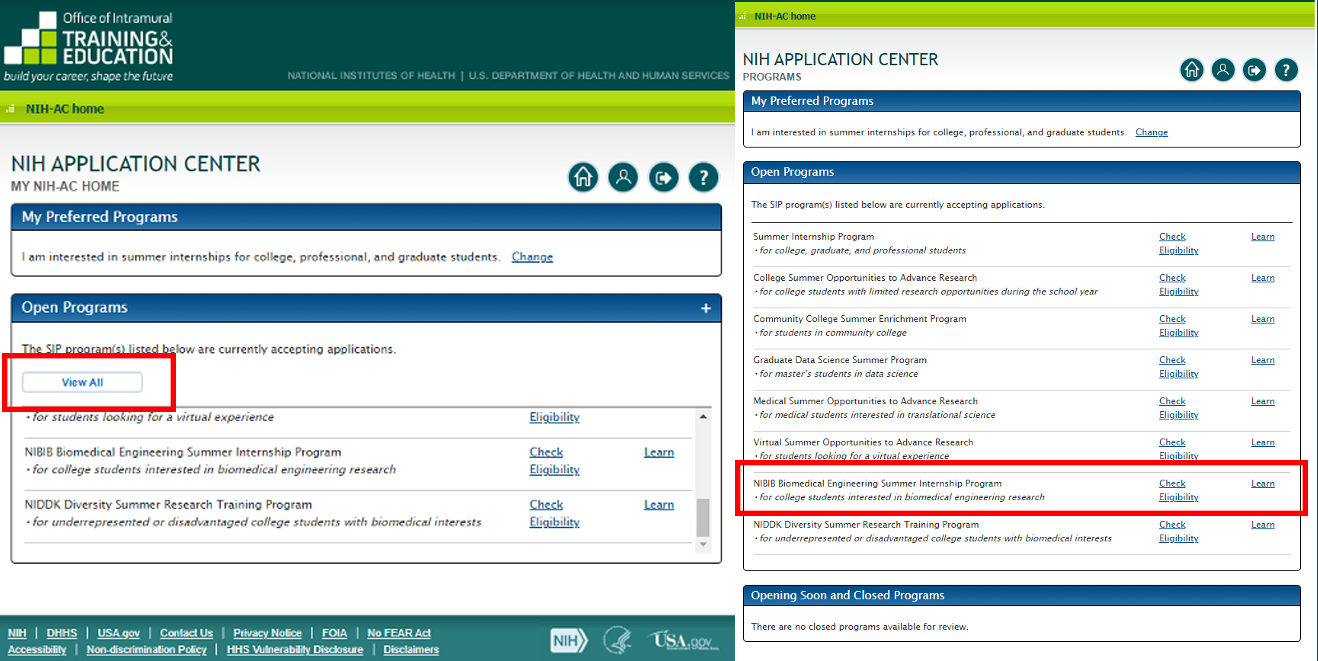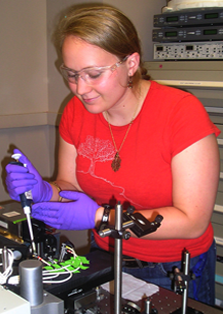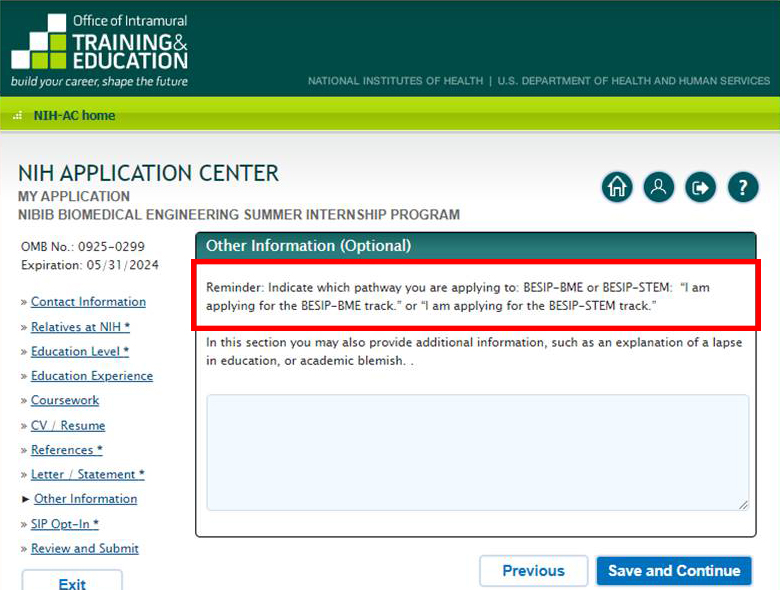
BESIP Eligibility
- Applicants must be at least 18 years old by 6/15/2024.
- Applicants must be United States citizens or permanent residents.
- Applicants must have an average GPA of 3.0 or greater.
All interns must be present on-site to participate in the entire ten-week program between June 3, 2024 and August 9, 2024. Please do not apply if any other plans would preclude you from being present for the full 10 weeks. It is sometimes possible for students attending schools that break for summer later than the program start date (June 3) to participate by getting permission from their professors to take some final exams proctored at NIH.
For BESIP-BME:
Applicants must be enrolled in an accredited college or university in the United States and be working towards a bachelor’s degree in engineering, physical science, or computer science. At least one of your letters of recommendation should come from a faculty member or MD, PhD, or MD/PhD research supervisor who can speak directly to your aptitude for research. Applicants should have completed at least three years of undergraduate study by summer 2024 and have prior hands-on experience in biomedical engineering research.
For BESIP-STEM:
Applicants must be enrolled in an accredited community college, college, or university in the United States as an undergraduate, and have completed at least one year of study by summer 2024.
BESIP-STEM is for students who want to “beta-test” biomedical engineering as a future goal. Interested students for this program:
- Are majoring in engineering, physical science, and computer science but have not had a previous opportunity to pursue an in-person biomedical engineering research experience.
OR - Are NOT majoring in engineering, physical science, or computer science but are interested in pursuing biomedical engineering in graduate school or as a career. This could include applicants from other science majors such as biology, biochemistry, mathematics, chemistry, and other related biomedical disciplines.
How to Apply:
Applications for BESIP are completed online using the NIH SIP application form. You will need to set up an SIP account and follow the instructions on the SIP form. BESIP is a special subprogram of SIP entitled NIBIB – BESIP under the OPEN PROGRAM heading. You must select NIBIB-BESIP in the SIP’s Open Program listing to apply for BESIP.
Once you select NIBIB-BESIP from the Open Program list, you should click on “Check Eligibility” to continue on with the application process.
One important difference between the general SIP and the BESIP programs is the mentor matching and project selection process. BESIP asks that you do NOT call any mentors on the project list until you have been selected as an intern for the BESIP program.

While filling out the application, you will encounter a section labelled OTHER INFORMATION. In this section, you must choose which track of BESIP that you are applying for. You can write “I am applying for the BESIP-BME track” or “I am applying for the BESIP-STEM track.
After you fill out your Profile in the NIH Application Center, you will begin your application. The application form has multiple sections to complete. For BESIP, the sections listed below are REQUIRED.
 Coursework:
Coursework:
Please enter a complete list of courses and grades from your current school. You can copy and paste a transcript into the online application, but please check that the pasted text is easily read. An official transcript will be requested of the selected interns before they start the internship program.
CV/Resume:
This section is mandatory for BESIP and should include information about the student's education, achievements, recent research and work experience, activities and awards.
References:
These letters should come from individuals who can speak to the applicant’s suitability for this program, for example a faculty member familiar with the student's academic record, or a faculty member or research lab leader who can address the student’s aptitude for research. If you are applying to the BESIP-BME track, at least one of your letters of recommendation should come from a faculty member or MD, PhD, or MD/PhD research supervisor who can speak directly to your aptitude for research. Requests for these letters and instructions for submission will be e-mailed directly from the online web application system to the recommenders you have listed, once the student portion of the application is completed. Although you will not be able to view the contents of the reference letters, you can see whether they have been submitted; reach out to the program director if you are having problems.
Letter/statement:
A written personal statement/cover letter ( ~500 words) briefly discussing items such as:
- Career goals
- Technical and research interests
- Reasons for applying for BESIP
- Potential benefits that will come about as a result of your participation in BESIP
- Other background information you feel will help the committee.
Other Information:
You must use the “Other Information” section of the SIP Application form to state which BESIP track you are applying for. State either “I am applying for the BESIP-BME track” or “I am applying for the BESP-STEM track”. You may also use this section to provide any additional information for your application.

SIP Opt-In:
If you are not selected for BESIP, you may choose to make yourself available for the general SIP program. You can make this choice in the “SIP Opt-In” section of the form. Follow the instructions to Opt-In to be considered for general SIP internships.
There is a wealth of information about all NIH summer internships on the general NIH training site, including tips for applying successfully. One important difference between the general SIP and the BESIP programs is the mentor matching and project selection process. BESIP asks that you do NOT call any mentors on the project list until you have been selected as an intern for the BESIP program.
Deadlines and important dates:
It is the applicants’ responsibility to be sure that all application materials, including letters of recommendation, are submitted on time for BESIP.
- Online application must be submitted by February 16, 2024
- Reference letters must be submitted by February 23, 2024
- Notification of selected interns will begin on March 4, 2024
Stipend and Benefits
The BESIP summer stipend varies depending on the years of undergraduate education completed by the start of the summer. The stipend amount is based on the NIH Policy Manual for Intramural Research and Training Awards (IRTA) stipends for the Summer Internship Program (SIP); the table can be found here. BESIP pays at the top of the posted range. As an example using the current table, as of May 1, 2023, a student who has completed one year of undergraduate education is eligible for a monthly stipend of $3010. For the ten week internship, this corresponds to approximately $6800 in total. A student who has completed three years of undergraduate coursework would receive a 10-week total of approximately $7500. Stipends will be dispensed in arrears as a prorated amount at the end of the months of June, July and August for the ten-week duration of the program.
BESIP interns frequently elect to share local housing to reduce the housing costs. Information about housing can be found at the Office of Intramural Education and Training (OITE) website https://www.training.nih.gov/assets/Moving_Guide.pdf. The intern must pay living expenses and any travel expenses to and from NIH from the summer stipend.
